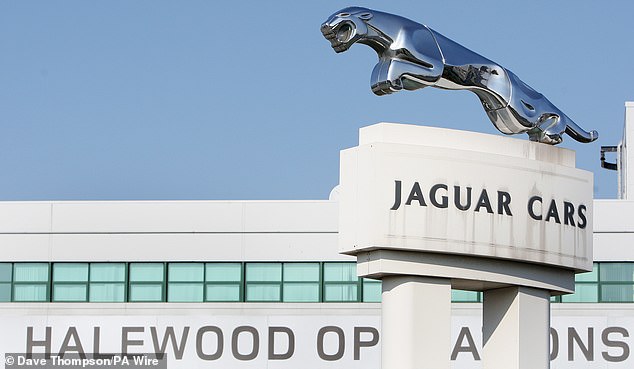The cyber-hack which has paralysed Jaguar Land Rover (JLR) for nearly a month is turning out to be a catastrophe with disastrous implications for the wider UK economy.
So far, the stoppage has cost JLR about 24,000 vehicles of lost output, around £150million in profits and roughly £2billion in lost revenue as plants in the UK, Slovakia, Brazil, India and China have been brought to a standstill.
Now the crisis has deepened further with the news that India’s Tata, which owns JLR, has extended the shutdown for at least another week because the IT systems which were hacked are still not running properly.
This will have an even more devastating impact on the broader economy because of fears that JLR’s entire supply chain across the country could disintegrate.
JLR, which usually makes about 1,000 cars a day, and employs more than 30,000 workers in the West Midlands and on Merseyside, depends on hundreds of smaller suppliers for parts and services.
Another 200,000 workers are employed in this chain. Even if production starts up soon, it will take months for the factories to be working smoothly again, putting those smaller suppliers in jeopardy.

Hacked: Jaguar Land Rover usually makes about 1,000 cars a day and employs 30,000 workers at its Solihull and Halewood plants (pictured) and engine facility in Wolverhampton
JLR bosses say they are doing what they can to support suppliers. There is no reason to disbelieve them – it’s in JLR’s interest to keep them alive, but there is only so much it can do.
Support is needed, and fast. Professor David Bailey at the University of Birmingham warns that many suppliers face bankruptcy unless the Government intervenes quickly to support them with some sort of furlough-style scheme.
Industry ministers, who met JLR yesterday, have ruled out calls by the Unite union to subsidise the wages of workers laid-off temporarily or to support suppliers.
Unite has suggested ministers look at the furlough scheme set up by the Scottish government to support jobs at bus-maker Alexander Dennis.
Another proposal comes from the Conservative MP for Meriden and Solihull East, Saqib Bhatti. He suggests the Government brings together banks to organise some form of short-term loans for smaller suppliers.
Both options are sensible. Both should be seriously considered by ministers, who should be pulling out all the stops to prevent this disaster from spreading, even if it means adding to the spending bill until JLR is back on its feet.
This would be far better than having to pay out welfare benefits to thousands of workers who are in danger of losing their jobs – and ripping the heart out of what has been such a thriving industry.
Rocketing food
The face of the young lady working the till at my local garage said it all.
She dreads going to the supermarket, she told me, because every time she stocks up for the family’s weekly shop, it’s another £10 or more on the bill.
And she gives an example: Maris Piper potatoes, which were £1.80 three weeks, now cost £2.45 – a jump of more than a third. She has good reason to be worried, as we all do with food inflation set to climb even higher.
Soaring basic food costs are one of the main reasons the boffins in Paris at the Organisation for Economic Co-operation and Development forecast that inflation is likely to average 3.5 per cent this year, which is 0.4 percentage points higher than its previous forecast.
That means we still have the highest and stickiest inflation across the advanced economies, which ranges from 1.1 per cent in France and 1.9 per cent in Italy to 2.7 per cent in the US and 3.1 per cent in Japan.
Ironically, the UK’s problem is that most of our food inflation is home-grown.
As the British Retail Consortium constantly points out, the rise in food prices can be blamed almost entirely on the higher minimum wage, the £25billion raid on employers’ National Insurance Contributions and the new packaging tax.
There is more to come: industry experts predict that food prices will rise still higher to 6 per cent.
And, ironically, it is the less well-off ‘working people’ and the most vulnerable in society who spend a disproportionate amount of their income on food.
DIY INVESTING PLATFORMS

AJ Bell

AJ Bell
Easy investing and ready-made portfolios

Hargreaves Lansdown

Hargreaves Lansdown
Free fund dealing and investment ideas

interactive investor

interactive investor
Flat-fee investing from £4.99 per month

InvestEngine

InvestEngine
Account and trading fee-free ETF investing
Trading 212
Trading 212
Free share dealing and no account fee
Affiliate links: If you take out a product This is Money may earn a commission. These deals are chosen by our editorial team, as we think they are worth highlighting. This does not affect our editorial independence.
Compare the best investing account for you
#Labours #great #JLR #test #Government #support #suppliers #protect #jobs #MAGGIE #PAGANO
















